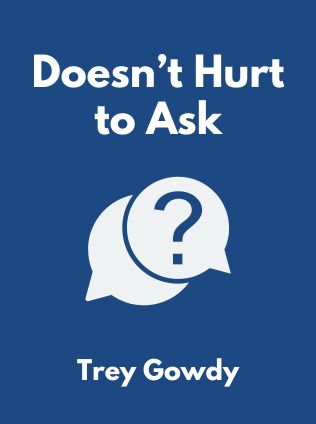
Doesn’t Hurt to Ask
Using the Power of Questions to Communicate, Connect, and Persuade
By Trey Gowdy
Published 11/2020
About the Author
Trey Gowdy is a distinguished former state and federal prosecutor who spent sixteen years advocating for victims in the courtroom. His career in law was followed by eight impactful years in Congress, where he worked tirelessly to represent his constituents. Gowdy chaired the House Committee on Oversight and Government Reform and the Select Committee on Benghazi, contributing significantly to national legislative processes. After serving four terms, he chose to return to private law practice. Trey Gowdy is also a New York Times bestselling author, co-authoring the acclaimed book "Unified." His extensive experience in persuasion, both in legal and legislative arenas, forms the backbone of his insightful book, "Doesn't Hurt to Ask: Using the Power of Questions to Persuade."
Main Idea
The central theme of "Doesn't Hurt to Ask" revolves around the art of persuasion through the strategic use of questions. Gowdy asserts that effective questioning is a powerful tool for influencing others, whether in a courtroom, legislative hall, or everyday life. He believes that asking the right questions at the right time can lead people to their own conclusions, making them more likely to adopt new perspectives. This method of persuasion is not about winning arguments but about fostering understanding and collaboration, ultimately leading to meaningful change.
Table of Contents
- Introduction: The Power of Questions
- The Essentials to Know Before You Start Speaking
- The Right Questions at the Right Time
- The Two Intentions of Questions
- Leading and Non-Leading Questions
- The Art of the Follow-Up Question
- Building Your Case with Questions
- Overcoming Resistance with Questions
- Conclusion: Becoming a Master Persuader
Introduction: The Power of Questions
In the introduction, Gowdy lays the foundation for the book by emphasizing the unparalleled power of questions in the process of persuasion. He shares his journey from feeling inadequate in high-stakes conversations to mastering the art of questioning, which became his most effective tool in both his legal and political careers. Gowdy's approach is grounded in the belief that questions, rather than statements, engage people more deeply and allow them to arrive at conclusions on their own.
"The skill set needed is the same whether the issue is murder, marketing, or motherhood." - Trey Gowdy
The Essentials to Know Before You Start Speaking
Before diving into specific questioning strategies, Gowdy outlines several essential principles for effective persuasion. He stresses the importance of sincerity, understanding your audience, and being well-informed. These foundational elements set the stage for successful persuasive communication.
Sincerity
Gowdy underscores the necessity of genuine sincerity in persuasion. He recounts advice from his mentor, David Stephens, who emphasized that sincerity is the cornerstone of effective communication.
"The secret to being a good communicator, Trey, is sincerity. Once you learn to fake that, there is nothing you cannot do." - David Stephens
However, Gowdy cautions against faking sincerity, as true passion and authenticity are what genuinely move people.
Sign up for FREE and get access to 1,400+ books summaries.
You May Also Like
The Subtle Art of Not Giving a F*ck
A Counterintuitive Approach to Living a Good Life
By Mark MansonRich Dad Poor Dad
What the Rich Teach Their Kids About Money - That the Poor and Middle Class Do Not!
By Robert T. KiyosakiHow To Win Friends and Influence People
The All-Time Classic Manual Of People Skills
By Dale CarnegieQuiet: The Power of Introverts
The Power of Introverts in a World That Can't Stop Talking
By Susan Cain



















